Here’s a recipe of the famous Spanish Roast Suckling Pig.
All countries have some dishes that are very important to people since it unites them culturally at different levels.
To fulfill this role, Spain has the Roast Suckling Pig, a fantastic Spanish recipe that comes from the south of the country and is already more than a classic of this cuisine.
The cochinillo asado, or as it is known in English, roasted pig, is one of the most popular recipes, and it is extremely easy to make.
Continue reading this article as you will learn more about this Asado recipe, such as how to roast a sucking pig, how to serve it, and how to store it.
You will also delve deeper into the history of this fantastic Spanish dish that has enchanted Spanish families for hundreds of years.
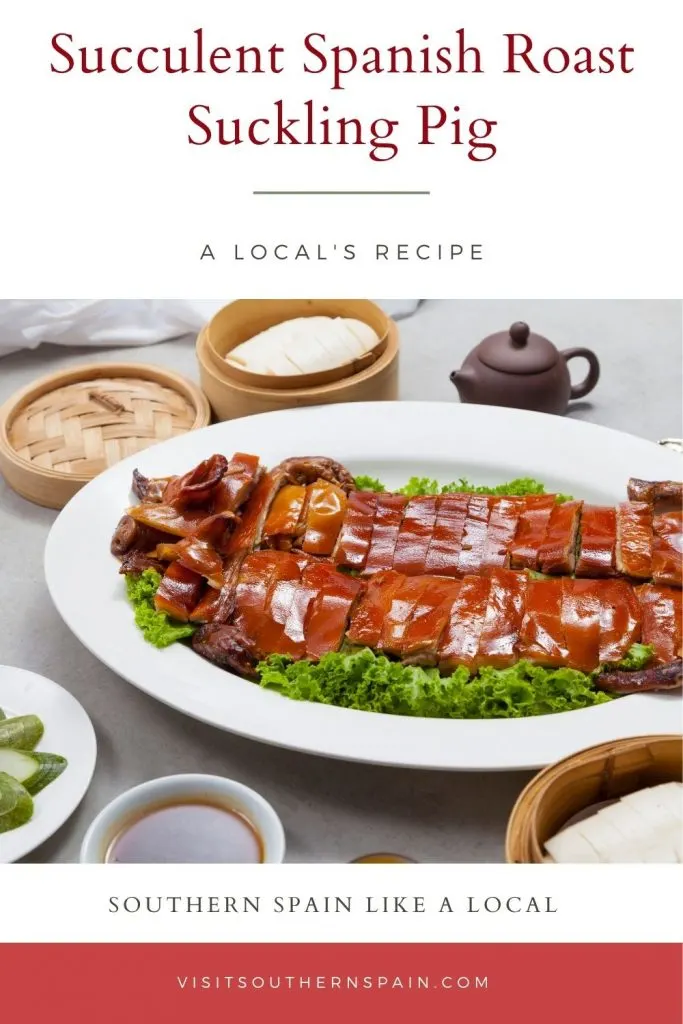
You, dear reader, support this blog. If you purchase through a link, we earn a small commission. As an Amazon Affiliate, we earn from qualifying purchases.
Pssst…!!?? You can’t get enough of Spanish Recipes? Have a look at my other posts:
Background of the Dish
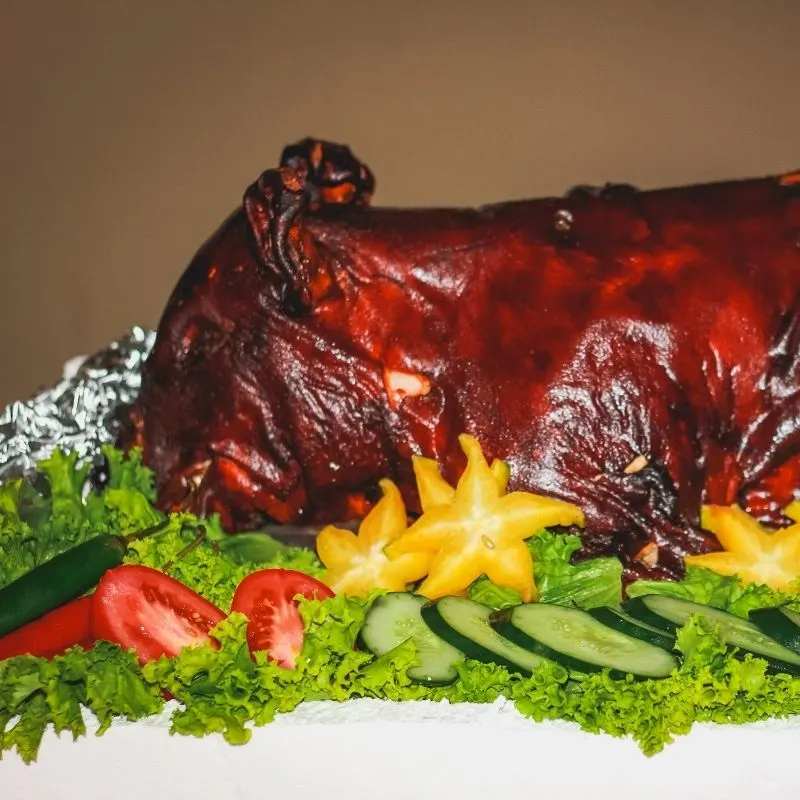
The whole roasted pig is a type of food that can be found in many versions from multiple countries.
However, in this article, we will delve into the roast piglet recipe that was created in Spain.
The Spanish piglet roast arrived in Spain centuries ago, more precisely when the invasion of the Roman Empire to those lands occurred.
Its popularity began to grow from there until, in the seventeenth century, it was found in all the taverns of the richest cities in the country.
It was a dish worthy of royalty, and it was even served when guests from other kingdoms came since Spain was seen as a prosperous nation.
For this reason, today, conchinillo, is served as a real feast to enjoy during the winter festivities or to surprise guests.
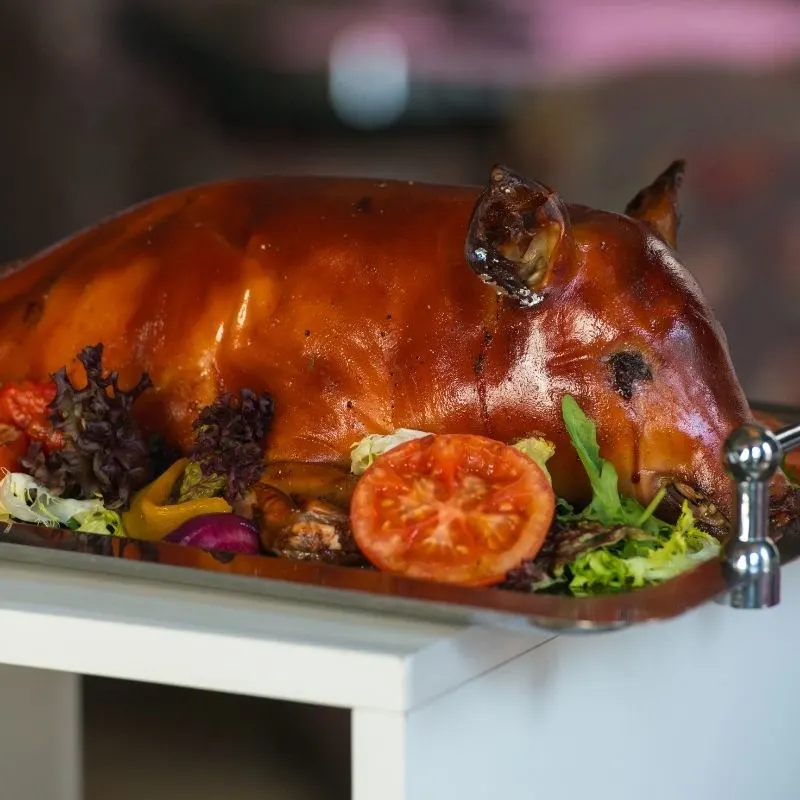
Things You’ll Need for Roast Suckling Pig
Making a whole pig roast may sound a little bit intimidating, but it is super simple.
For the ingredients, the main one is the Spanish suckling pig, and the others are completely replaceable.
The only equipment that you need is a large cooking tray of any kind and a working oven.
If you want to know how to cook cochinillo in oven, read more below.
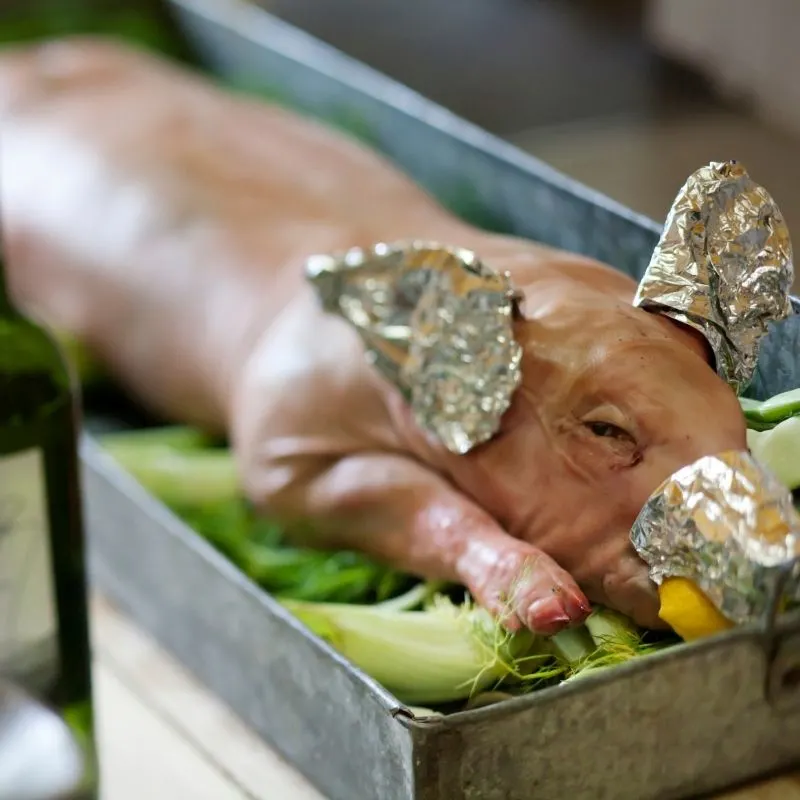
Ingredients
- 1 (4kg) suckling pig
- 25 g lard
- Water
- Salt and pepper to taste
How to Make Roast Suckling Pig – Step by Step Guide
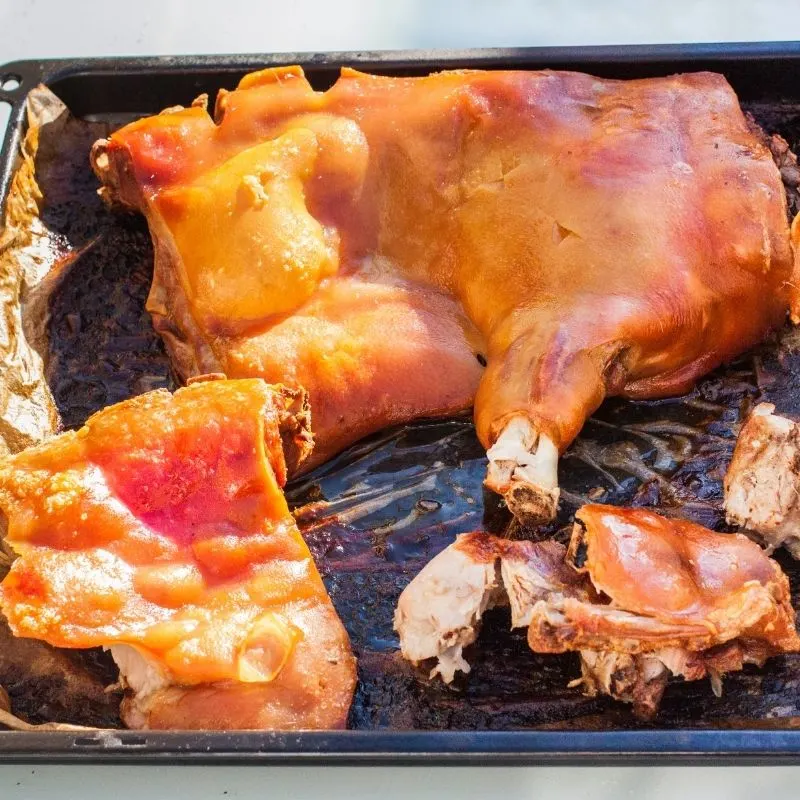
- To get started with this roasted suckling pig, preheat the oven to 190 ° C. Put salt and pepper to taste in the suckling pig. Spread it with the lard; this will give it a crunchy texture.
- Put the suckling pig on top of the ribs on a tray large enough to hold the suckling pig Spain and any juices it might release. See the additional notes for more tips on this step.
- Cook for 90 minutes with the steam function to make it more tender. If your oven doesn’t have this, put the suckling pig on top of your oven and put a deep tray with water on the bottom; when this water boils, it will steam up your oven and give it the desired effect.
- After that time, turn the suckling pig roast over and let it cook for an extra 40 minutes. Never increase the temperature, or it might burn.
- Serve warm. Check the “tips on serving” section for more ideas.
La Paella: Deliciously Authentic Rice Dishes from Spain’s Mediterranean CoastCarbon Steel Paella PanPaella Seasoning from SpainSpanish AioliOrganic Extra Virgin Olive OilForum – Spanish Cabranet Sauvignon Red Wine Vinegar – 500 mL
Substitution of Ingredients
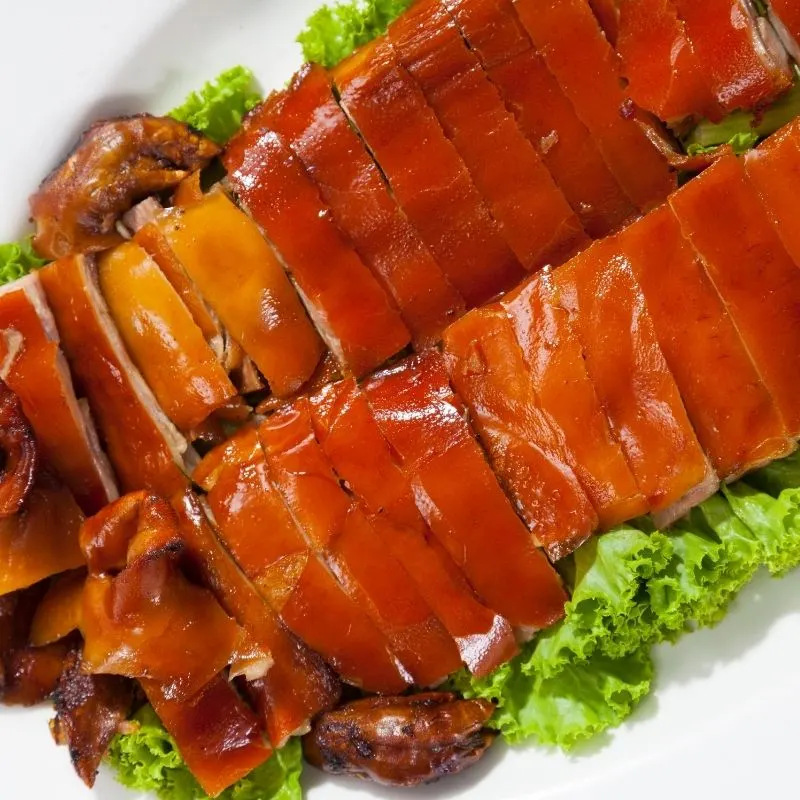
The Roast suckling pig recipe is a recipe for roasted piglet, meaning that the piglet meat is the main component.
This means that, unfortunately, if some diner is vegan, vegetarian, or doesn’t like the pig, they should eat something else since the whole point of this recipe is to make a pig roast.
Besides that, the only other ingredient you might have trouble finding is the lard, but you can replace it with regular butter or even 4 tablespoons of olive oil.
If you liked this Cochinillo recipe, I encourage you to try other fantastic winter-season Spanish recipes, such as the classic Christmas turkey, beef soup recipe, or the delicious Picadillo soup.
Make sure you try the Spanish pork chops recipe as well for a meaty and nutritious dinner.
Tips on Serving Roast Suckling Pig
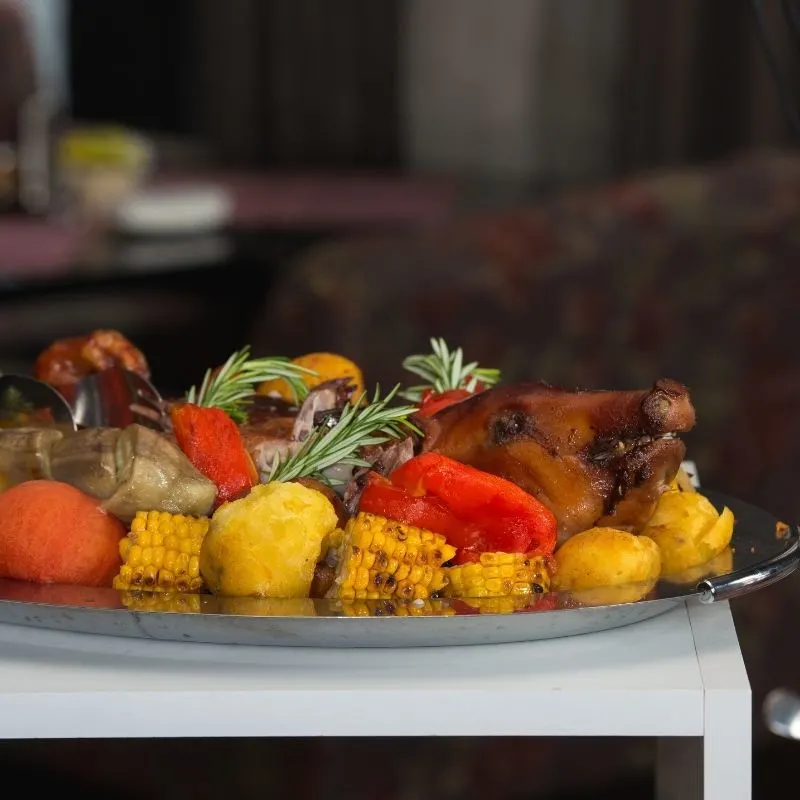
Like other suckling pig recipes, this one is pretty simple, so you can even serve the pig right away from the oven.
However, there are some tips for serving that will elevate the quality of this dish and impress everyone.
For example, for this pig roast recipe, you can prepare a large tray with clean and fresh lettuce leaves and serve the suckling pig on top of all those vegetables.
You can also prepare vegetables such as potatoes, sweet potatoes, carrots, onions, and baked corn in the same tray where you prepared the pig roast.
How to Store Roast Suckling Pig
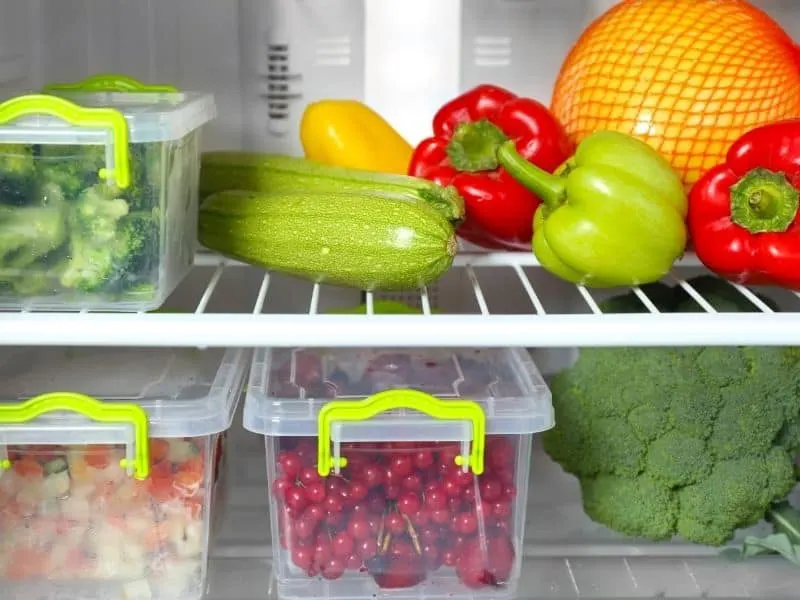
Now that you know how to cook suckling pig, let us discuss on how to store it.
This recipe stands out from other pig roast recipes because in this case, you can store the cooked pig in the freezer for up to 30 days without any problem.
All you have to do is cook it, let it cool to room temperature, and then store it in a covered container in the fridge for 5 days or for up to 30 days in the freezer.
Recipe Card: Roast Suckling Pig
Spanish Roast Suckling Pig Recipe
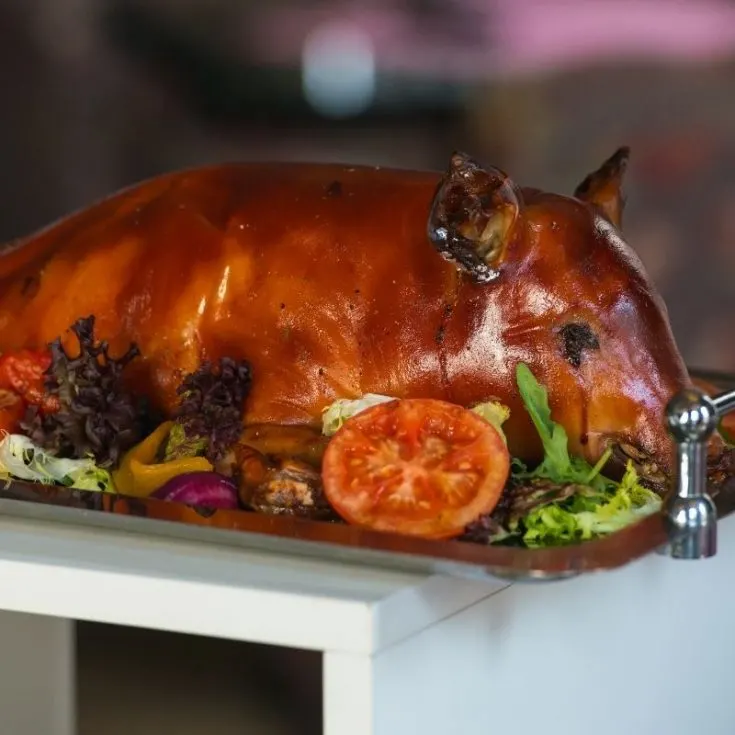
All countries have some dishes that are very important to people since it unites them culturally at different levels.
To fulfill this role, Spain has the Roast Suckling Pig, a fantastic recipe that comes from the south of the country and is already more than a classic of this cuisine.
The cochinillo asado or as it is known in English, roasted pig is one of the most popular recipes, and it is extremely easy to make.
Ingredients
- 1 (4kg) suckling pig
- 25 g lard
- Water
- Salt and pepper to taste
Instructions
- Preheat the oven to 190 ° C. Put salt and pepper to taste in the suckling pig. Spread it with the lard, this will give it a crunchy texture.
- Put the suckling pig on top of the ribs on a tray large enough to hold the suckling pig and any juices it can release. See the additional notes for more tips on this step.
- Cook for 90 minutes with the steam function to make it more tender. If your oven does not have this, then put the suckling pig on top of your oven and put a deep tray with water on the bottom, when this water boils it will steam up your oven and give it the desired effect.
- After that time, turn the suckling pig over and let it cook for an extra 40 minutes. Never increase the temperature, otherwise, it can burn.
- Serve warm and enjoy.
Notes
Since this is a whole cooked pig, it is important that you buy a suckling pig weighing 4 kilograms or less, otherwise it will probably not go into an oven.
Of course, if you have a bigger oven then buy as much Cochinillo as you want. If the suckling piglet is too big for your oven, then cut the hams and cook them on a separate tray.
You can follow other suckling pig recipes and replace the butter with 4 tablespoons of olive oil, or completely eliminate this fatty ingredient (although it gives a fantastic touch to the dish).
Nutrition Information
Yield
6Serving Size
1Amount Per Serving Calories 308Total Fat 33gSaturated Fat 12gCholesterol 41mgSodium 231mgCarbohydrates 3gFiber 1gSugar 1gProtein 1g
FAQs about Roast Suckling Pig Recipe
What is a suckling pig?
A suckling pig is a young pig between two and six weeks old, still nursing on its mother’s milk, prized for its tender meat, and commonly prepared whole, often roasted, as a delicacy for special occasions.
What are suckling pig main ingredients?
The main ingredients for our Cochinillo Spain recipe are a 4kg suckling pig, 25g of lard, water, and salt and pepper to taste.
How to say roasted pig in Spanish?
In Spanish, roasted pig is called “cochinillo asado.”
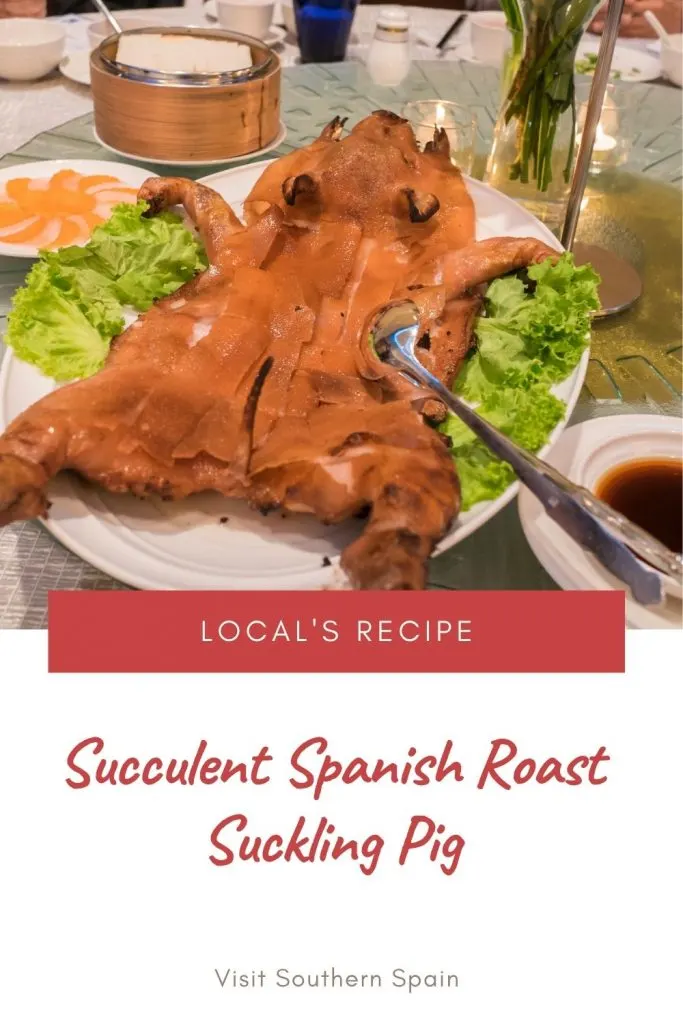
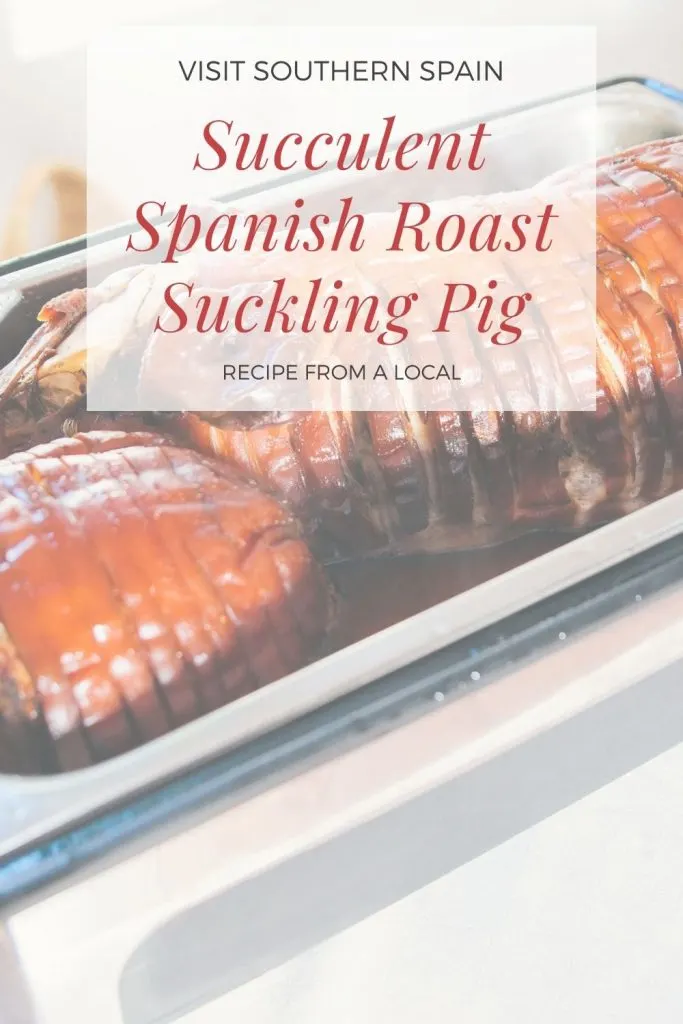

Hola, I’m Paulina! Together with my team, we are passionate about Southern Spain. Here we share all you need to know for great times in Southern Spain with the best places to visit, stay and, of course, the best food to eat.
Let’s dive in and explore Southern Spain’s outdoors, food and culture con pasión!

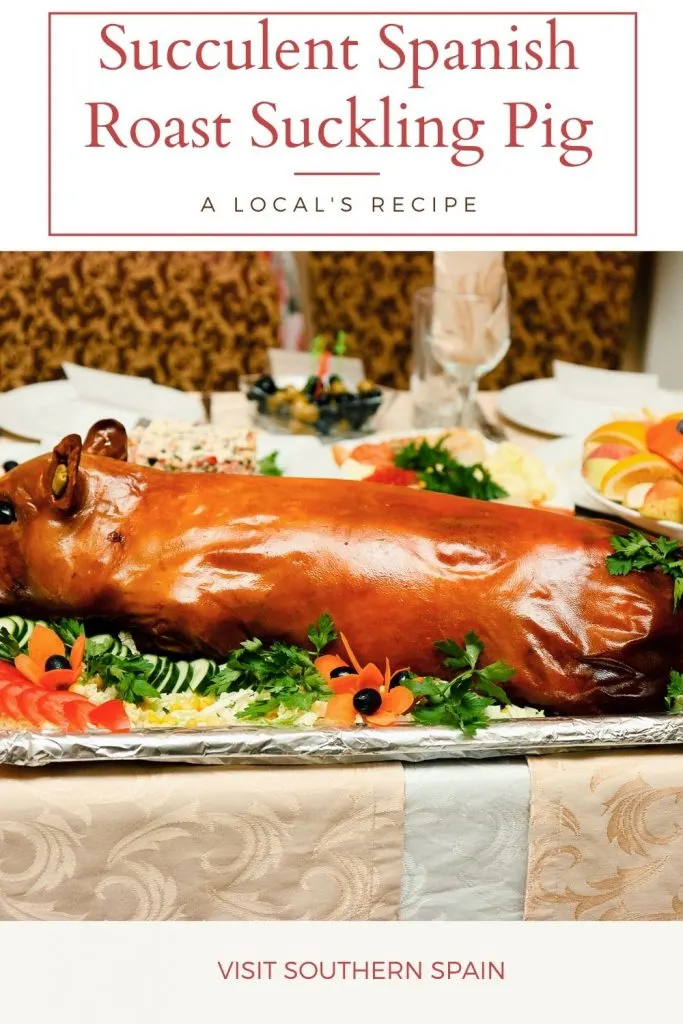







Martin Nordaas
Tuesday 8th of November 2022
I live in Thailand, Hua Hin where there are a number of stalls/restaurant that serve bbq’d suckling pig. I prefer to buy when half cooked by them, then finish it off in my oven (steam at 190c quarter steam, or at 175c without steam) either in full if we have guests, or chopped into portions for our own consumption. To ensure crisp skin, I apply a little olive oil by a small brush. Put simply the pig is perfect when the skin is perfect. I had my best suckling pig ever in a family restaurant in Madrid, approximately 1978, that memory will stay with me forever, as will the Carlos Uno they topped into my glass afterwards!